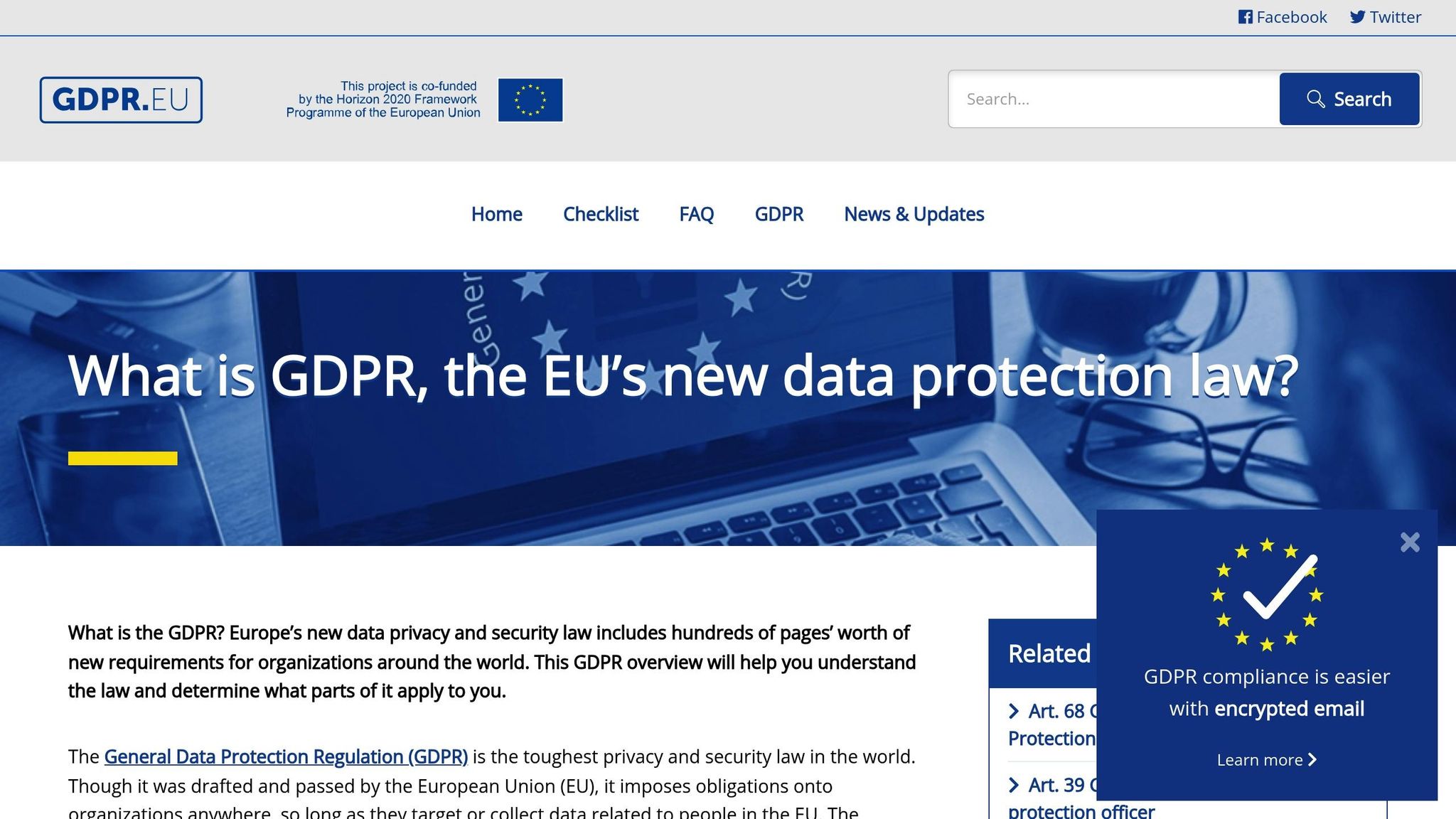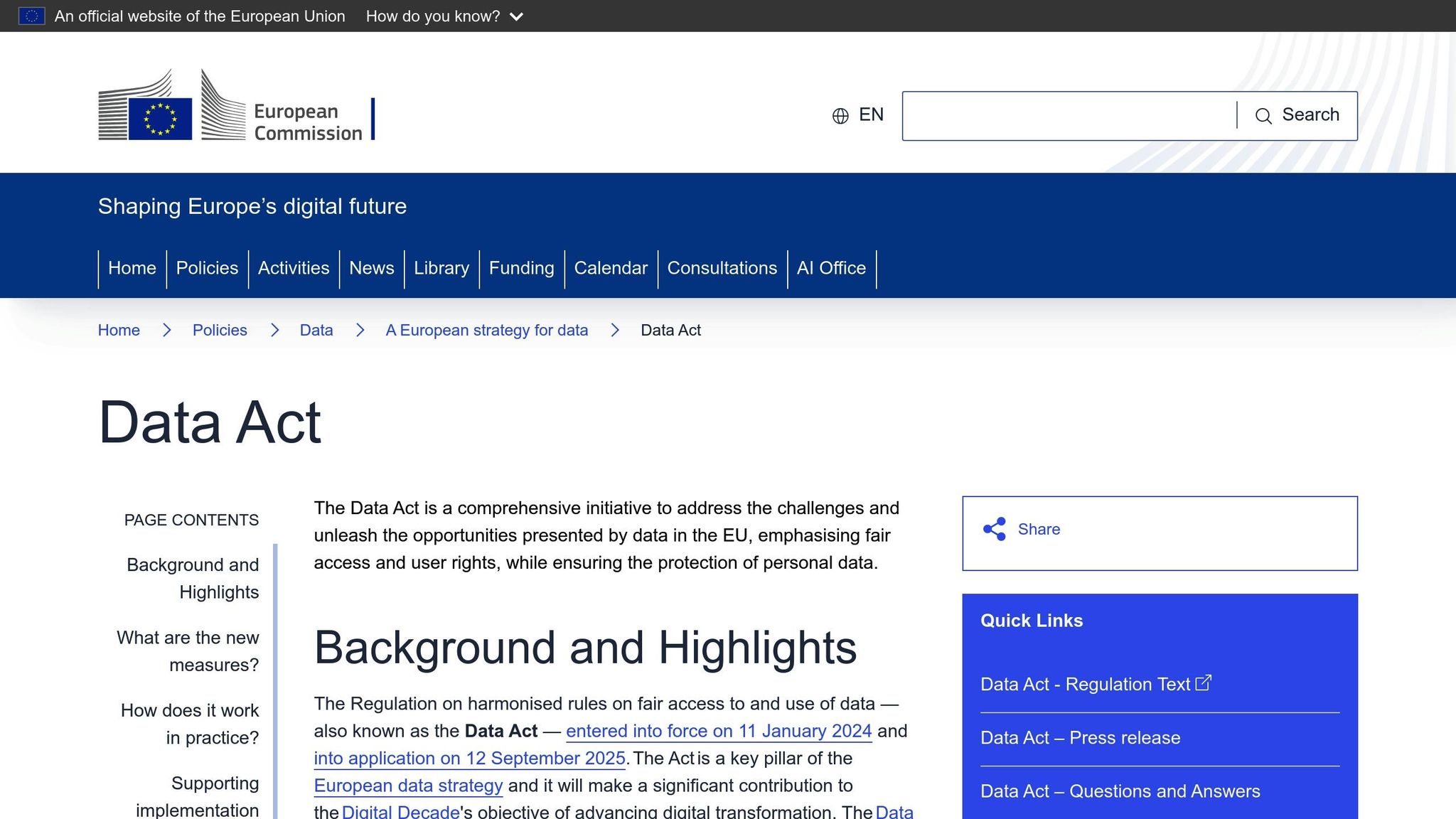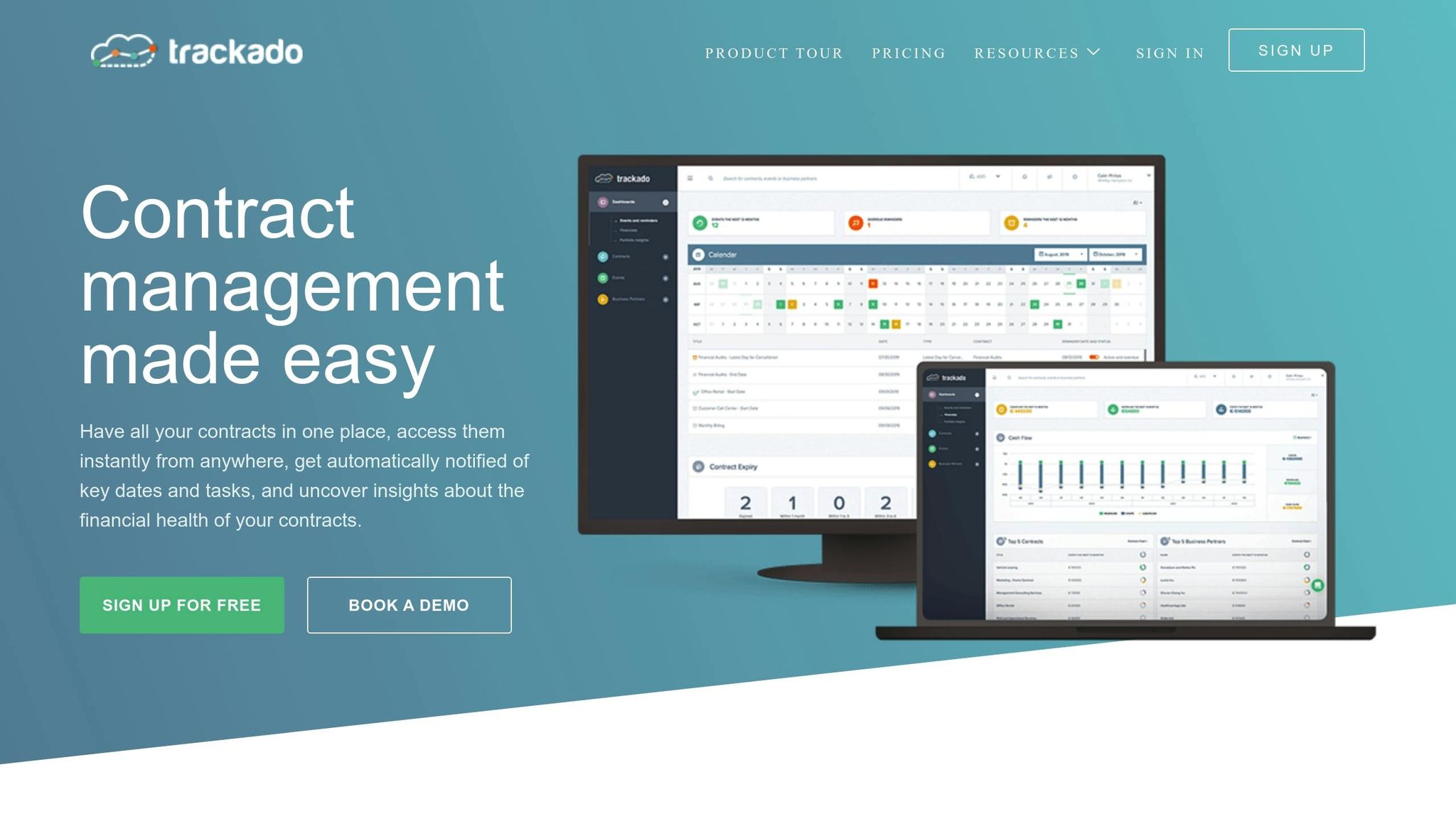
Navigating privacy compliance in cloud contracts is no longer optional. With regulations like GDPR, CCPA, and the upcoming EU Data Act (effective September 2025), businesses face strict requirements that impact how they handle data in cloud environments. Noncompliance risks hefty fines – up to €20 million or 4% of global turnover under GDPR – and reputational damage.
Here’s what you need to know:
- GDPR: Requires clear roles for data controllers/processors, breach notifications within 72 hours, and transparency about subprocessors.
- CCPA/CPRA: Focuses on consumer rights, including opt-outs for data sharing and response times for deletion/access requests (45 days).
- Industry-Specific Rules: Healthcare (HIPAA), financial services (PCI DSS), and government agencies (FedRAMP) demand stricter contract terms.
- EU Data Act: Introduces data portability, bans switching fees by 2027, and mandates open APIs.
Key contract elements include data processing terms, retention schedules, encryption requirements, and breach notification protocols. Automated tools like Trackado simplify compliance with features like centralized storage, milestone reminders, and AI-powered data extraction.
Staying compliant means regular audits, staff training, and leveraging technology to manage evolving regulations. This guide breaks down practical strategies to safeguard your business while meeting privacy requirements.
Privacy Regulations That Affect Cloud Contracts
Understanding the privacy laws relevant to your operations is crucial to avoiding violations and safeguarding your business. Depending on where you operate and who your customers are, you may need to comply with multiple regulations simultaneously.
GDPR, CCPA, and CPRA Requirements
The General Data Protection Regulation (GDPR) remains a cornerstone of privacy law globally, especially for cloud contracts. It applies to any organization that processes the data of EU citizens. If your U.S.-based business serves EU residents, GDPR compliance is a must.
Under GDPR, your contracts must clearly define the roles of data controllers and processors, require vendors to process data strictly based on your instructions, and include a provision for breach notifications within 72 hours. Additionally, these agreements should detail how to handle data subject rights, such as requests for access, erasure, or portability of personal data.
Transparency about subprocessors is another essential GDPR requirement. Cloud providers must maintain an up-to-date list of all subprocessors and obtain your approval before adding new ones. This ensures you’re fully aware of who has access to your data and can evaluate their compliance measures.
Meanwhile, the California Consumer Privacy Act (CCPA) and its updated version, the California Privacy Rights Act (CPRA), emphasize consumer rights and data transparency. CPRA adds protections for sensitive personal information, such as biometric and geolocation data. Contracts under these laws must include clear provisions for consumers to opt out of data sharing and address data access or deletion requests within 45 days.
The main difference between GDPR and CCPA/CPRA lies in their focus: GDPR prioritizes comprehensive data protection through detailed processor agreements, while CCPA and CPRA concentrate on giving consumers more control and visibility into data practices.
In addition to these general privacy laws, specific industries impose their own unique requirements for cloud contracts.
Industry-Specific Privacy Rules
Many industries have stricter compliance needs that directly influence cloud contract terms, often requiring enhanced security measures and detailed documentation.
Healthcare organizations must comply with the Health Insurance Portability and Accountability Act (HIPAA) when using cloud services. Any cloud provider handling protected health information (PHI) must sign a Business Associate Agreement (BAA) that outlines encryption standards, access controls, and audit logging protocols. Non-compliance can lead to penalties ranging from $100 to $50,000 per violation, capped at $1.5 million annually.
Financial services are subject to regulations like the Payment Card Industry Data Security Standard (PCI DSS) for processing credit card data. Additionally, the EU’s Digital Operational Resilience Act (DORA) mandates that financial firms ensure their cloud providers meet strict operational resilience requirements, including incident reporting and business continuity planning.
Defense contractors working with Controlled Unclassified Information (CUI) need to align with the Cybersecurity Maturity Model Certification (CMMC). This framework demands cloud contracts specify security controls, require third-party assessments, and include robust supply chain compliance documentation.
For government agencies, cloud providers often need FedRAMP authorization, which involves rigorous security assessments and continuous monitoring. These requirements should be clearly reflected in contract terms.
New Developments: EU Data Act and Data Portability
Emerging regulations are reshaping how cloud contracts address privacy and operational requirements. The EU Data Act, set to take effect in September 2025, introduces new rules around data portability and interoperability, altering the dynamics between businesses and cloud providers.
Under the Data Act, cloud contracts must include provisions for seamless data transfer between providers. Providers are required to deliver customer data in a machine-readable format within 30 days of a termination request. This reduces vendor lock-in and makes switching providers more straightforward.
The regulation also mandates open APIs to enable smooth data exchanges between platforms. Contracts should specify these technical requirements and ensure compliance with standardized data formats.
By January 2027, the Data Act will ban switching fees for cloud customers. This means cloud providers can no longer charge for data export or migration assistance, fundamentally changing how cloud services are priced and negotiated.
These changes will require businesses to revisit existing cloud contracts and ensure new agreements address key areas like data portability timelines, interoperability standards, and procedures for switching providers. The regulation also highlights the importance of incorporating privacy-focused technologies – such as encryption and anonymization – into security provisions.
For companies operating across multiple jurisdictions, the convergence of privacy regulations and emerging tech governance adds a new layer of complexity. Contracts must now include clauses addressing how AI systems and IoT devices handle personal data, with specific attention to algorithmic transparency and automated decision-making processes.
Required Elements for Privacy-Compliant Cloud Contracts
As privacy regulations continue to evolve, ensuring compliance in cloud contracts requires attention to specific clauses and provisions. By addressing key regulatory requirements, you can create agreements that not only protect personal data but also align with your business needs.
Required Contract Clauses
Data processing terms should clearly outline how personal data will be handled throughout the contract’s duration. This includes specifying the lawful basis for processing under GDPR, whether it’s consent, legitimate interest, or contractual necessity.
Data minimization clauses are essential for limiting the collection and processing of personal data to only what is necessary. The contract should list the categories of data being processed, their purposes, and retention periods. This approach helps mitigate privacy risks and demonstrates adherence to regulatory principles.
Retention schedules must detail how long data will be stored and include secure deletion procedures. For instance, if customer support tickets are processed, the contract might specify that personal data will be deleted after a set period unless legal requirements dictate otherwise.
User rights provisions are critical for enabling individuals to exercise their privacy rights. The agreement should mandate timely data access – within 30 days for GDPR or 45 days for CCPA – and ensure data is provided in a portable, machine-readable format.
Service Level Agreements (SLAs) should define performance metrics, uptime guarantees, and remedies for non-compliance. These agreements ensure the provider can meet privacy obligations and respond promptly to data subject requests.
Once these clauses are in place, the focus shifts to vendor management and security measures.
Vendor Management and Security Requirements
Third-party processor oversight is crucial for maintaining security across all layers of data handling. Contracts should include audit rights, allowing you to verify that cloud providers uphold security standards and comply with data protection laws.
Data Processing Agreements (DPAs) must be established with all sub-processors. These agreements should require the provider to seek your written consent before engaging additional processors and maintain an up-to-date list of sub-processors, detailing their roles and locations.
Encryption requirements should be explicitly defined for both data in transit and at rest. For example, healthcare organizations managing protected health information must meet HIPAA standards, while financial institutions may need additional safeguards like tokenization to comply with PCI DSS.
Breach notification procedures should require the provider to alert you of any data breaches within 24–48 hours of discovery. Notifications should include details about the breach, such as its nature and the types of data affected.
Access controls are vital for limiting who within the provider’s organization can access your data. Role-based access controls, multi-factor authentication, and regular access reviews should be mandatory to reduce the risk of unauthorized exposure.
| Security Requirement | Contract Specification | Compliance Benefit |
|---|---|---|
| Encryption | Data encrypted in transit and at rest using AES-256 or equivalent | Aligns with GDPR technical safeguards |
| Access Controls | Role-based access with multi-factor authentication | Minimizes unauthorized access risks |
| Audit Rights | Regular third-party security assessments | Ensures ongoing compliance |
| Breach Notification | 24–48 hours notification with detailed incident reports | Enables timely regulatory reporting |
Strengthening these security measures further enhances compliance, but it’s equally important to address user rights and business obligations.
User Rights and Business Obligations
Data subject request mechanisms should be clearly defined to ensure you can handle individual rights requests efficiently. This includes setting up procedures for accessing personal data, as well as managing deletion request workflows, which should account for challenges like data stored in backups or distributed systems.
Data portability mechanisms are becoming increasingly important, particularly with the EU Data Act taking effect in September 2025. Contracts should establish timelines for delivering data in machine-readable formats to meet compliance standards.
Objection handling procedures must specify how providers will stop processing personal data upon a legitimate objection, while still maintaining essential business operations.
Communication protocols between you and your provider are vital for managing data subject requests. The agreement should outline how requests will be forwarded and set clear timelines for coordinated responses, ensuring consistent communication with individuals.
Regulatory disclosure procedures should define how providers handle requests from authorities or law enforcement. Typically, the contract should require notification before disclosing personal data, allowing you to assess legal obligations and safeguard customer interests.
How to Maintain Privacy Compliance in Cloud Contract Management
Ensuring privacy compliance in cloud contract management requires more than just setting up contract clauses and vendor security protocols. It’s an ongoing process that relies on thorough audits, automated systems, and a well-trained team. These elements work together to keep your organization aligned with ever-changing regulations.
Data Audits and Flow Documentation
Regular audits are essential to track and manage personal data effectively. Start by taking inventory of all the data your organization collects – this might include names, email addresses, IP addresses, and even behavioral analytics.
Data flow mapping is another critical step. It involves tracing how data moves through your systems, from the moment it’s collected to its eventual deletion. This visual documentation becomes invaluable when addressing data subject access requests or undergoing regulatory audits.
Your mapping should also include data classification by sensitivity levels. For example, financial records, health information, and personal identifiers require stricter safeguards compared to general business communications. By categorizing data this way, you can focus your security efforts where they’re needed most and ensure your contracts reflect these priorities.
Don’t let your documentation go stale. Update it at least once a year or whenever there’s a major change in your data processes. Outdated records can leave you exposed during audits and make it harder to respond accurately to data subject requests.
Tracking metrics like completed audits, contracts with updated privacy clauses, and response times to data subject requests can help you pinpoint weaknesses and show regulators and clients that you’re making steady compliance progress.
Once the groundwork of data mapping and documentation is in place, automation becomes a game-changer for maintaining compliance.
Automated Tracking and Deadline Management
Managing contracts manually can be risky and time-consuming. Automated systems not only minimize human error – a factor in 80% of data breaches – but can also reduce compliance-related administrative tasks by up to 40%.
With centralized contract storage, your team can access the latest versions of documents from anywhere, eliminating confusion caused by scattered or outdated files.
Automated reminders for key dates can save you from costly mistakes. For instance, CloudKid found success with Trackado, which provided timely notifications for expiring contracts:
"Before using Trackado, managing our contracts was frustrating. We had a structure in place to store our contracts, but we didn’t have a nice overview which also gave us timely notifications of when they were expiring. This caused deals to renew or end automatically without us having the right infrastructure to avoid this from happening. The moment we knew we had made the right choice with Trackado was when we received email notifications that gave us a heads-up when something was ending or renewing. This really helped us to keep on top of things and avoid sticky situations with partners we didn’t want to continue working with."
- Yiannis Karavassilis, COO, CloudKid
Milestone tracking is another useful feature. It ensures you stay on top of compliance-related tasks like scheduled security assessments, updates to data processing agreements, and regular regulatory reviews.
Automating workflows for contract approvals can further enhance efficiency. These workflows create clear audit trails, which are vital for demonstrating compliance during regulatory reviews, while also maintaining consistent privacy standards across all agreements.
Staff Training and Compliance Awareness
Even the best systems can’t replace a knowledgeable team. Privacy compliance depends on employees understanding their roles and responsibilities. That’s why regular training is so important – it equips staff to identify risks and respond effectively to privacy-related issues.
Tailor training to the specific needs of each department. For example, legal teams should focus on understanding regulations, IT staff need to master technical safeguards and incident response, and procurement teams benefit from training on evaluating vendors and negotiating contracts with privacy in mind.
Real-world scenarios are particularly effective for training. Walk employees through exercises like responding to data access requests or handling breach notifications to ensure they’re prepared for actual situations.
Plan annual training sessions that include updates on new regulations. For instance, with the EU Data Act taking effect on September 12, 2025, organizations should start preparing staff now for the new rules on data portability and interoperability, which will significantly impact cloud contracts.
To measure the effectiveness of your training, use tools like quizzes, practical exercises, and certifications. These not only confirm that employees understand the material but also help them apply it in their daily work.
Lastly, don’t forget to document your training efforts. Keep records of who attended, what topics were covered, and how participants performed. This documentation can serve as proof of your commitment to compliance during audits and fosters a culture where privacy is a shared responsibility across your organization.
sbb-itb-49df6ae
Using Technology to Simplify Compliance
Modern technology has turned privacy compliance into a streamlined and efficient process. Contract management platforms now automate tasks, enhance security, and simplify meeting regulatory requirements. These advancements pave the way for tools like Trackado, which offer specialized features for privacy compliance.
Key Features of Contract Management Platforms
To effectively manage privacy compliance, contract management platforms should include the following features:
- AI-Powered Data Extraction: Automatically identifies and classifies sensitive information, enabling quick action to address compliance requirements.
- Data Processing Agreement (DPA) Templates: These templates ensure uniformity across vendor agreements, incorporating essential legal elements like data processing purposes, user rights, breach notifications, and safeguards for cross-border data transfers.
- Secure Data Storage with Encryption: Protects sensitive contract data both in storage and during transmission. By adhering to industry standards like TLS/SSL and AES-256 encryption, platforms meet the requirements of regulations such as GDPR, CCPA, and CPRA.
- Workflow Automation: Simplifies contract approvals, renewals, and compliance checks, while maintaining detailed audit trails. This ensures timely fulfillment of privacy obligations and provides documentation for regulatory reviews.
- Role-Based Access Controls: Restricts access to sensitive contracts based on user roles. When combined with multi-factor authentication, these controls minimize unauthorized access risks while maintaining operational efficiency.
- Integration Capabilities: Seamlessly connects with existing ERP and CRM systems, eliminating data silos and enhancing operational value.
With these features as a foundation, Trackado offers a tailored approach to meet stringent privacy compliance needs.
How Trackado Supports Privacy Compliance
Trackado is specifically designed to help organizations navigate privacy compliance with ease. Its secure European data center hosting provides added support for cross-border data transfers, crucial for meeting GDPR requirements.
The platform’s enterprise-grade SSL and encryption ensures all contract data remains secure during storage and transmission. As Trackado highlights:
"Trackado keeps your data private and safe with TLS/SSL and file encryption, ensuring what is yours stays yours" [1].
Trackado’s AI-powered data extraction identifies sensitive information within contracts automatically, making it easier to handle data subject access requests (DSARs) within the mandated timeframes – 30 days for GDPR and 45 days for CCPA and CPRA. This automation reduces manual work while improving accuracy.
With customizable fields, businesses can track compliance-specific details like data retention periods, processing purposes, and consent mechanisms, ensuring all necessary information is captured in contracts.
Milestone tracking and automated reminders help organizations stay on top of critical compliance deadlines, such as contract expirations, DPA reviews, audits, and DSAR responses. CloudKid’s experience demonstrates how automated notifications can prevent missed renewals [1].
A centralized contract repository offers instant, remote access to agreements, ensuring consistent privacy oversight. Marc Fielmich, Privacy & Security Officer at iChoosr, shared:
"Since transitioning to Trackado, everything has been very smooth, centralized, and super user-friendly" [1].
Trackado also includes integrated e-signing capabilities with full audit trails, ensuring all changes to privacy-related agreements are documented and traceable.
Looking ahead to regulations like the EU Data Act, which takes effect on September 12, 2025, Trackado’s API capabilities and structured data management prepare businesses for new requirements like data portability and technical interoperability. This proactive approach ensures organizations can adapt to evolving compliance landscapes.
These robust features make Trackado an excellent choice for small and medium-sized businesses seeking enterprise-level privacy compliance without the complexity or high costs often associated with larger platforms. Its intuitive design and strong security measures make achieving compliance both manageable and effective.
Conclusion: Managing Privacy Compliance Successfully
Ensuring privacy compliance in cloud contract management protects your business by lowering the risk of fines, reducing security vulnerabilities, and strengthening customer confidence.
Achieving success means weaving privacy-by-design into your operations – this includes conducting regular data audits, keeping DPAs up to date, and incorporating clear privacy terms into every cloud contract. With the EU Data Act set to take effect in September 2025, staying ahead of regulatory updates is more critical than ever.
Modern contract management platforms simplify compliance by automating key tasks like tracking deadlines and maintaining audit trails, all while safeguarding sensitive data. For instance, a mid-sized SaaS company managed to cut contract review time by 40% and successfully passed a significant audit without delays.
Kieran Lynch, Head of Legal and Compliance at Rakuten Europe, shared how adopting the right technology revolutionized their compliance approach:
"Without Trackado, we often found it difficult to find a specific contract that we knew we had, but it was hard to locate due to our various storage methods. Furthermore, going through the different stages of business input, drafting, approvals and signature was difficult without a formalized process and tool. And Trackado also improves our audit processes!" [1]
This insight highlights how specialized tools like Trackado can make a real difference. Its features – such as centralized storage, automated tracking, enterprise-grade European security, AI-driven data extraction, and customizable workflows – are designed to handle everything from GDPR data subject requests to preparing for the EU Data Act.
Investing in contract management technology delivers more than just regulatory compliance. It gives businesses clearer visibility into their contractual responsibilities, reduces administrative workload, and ensures they have the documentation needed for regulatory reviews. Moreover, it equips organizations with the flexibility to adapt as privacy laws continue to evolve.
FAQs
How do GDPR, CCPA, and CPRA differ in terms of cloud contract privacy compliance?
When it comes to privacy compliance in cloud contract management, GDPR, CCPA, and CPRA each bring their own set of rules, reflecting the priorities of their respective regions.
GDPR (General Data Protection Regulation) applies to businesses that handle the personal data of individuals in the European Union. It focuses on strict consent protocols, minimizing the collection of unnecessary data, and implementing strong security measures to protect data during processing and storage.
CCPA (California Consumer Privacy Act) is designed to safeguard the privacy rights of California residents. It gives individuals the ability to access their personal data, request its deletion, and opt out of the sale of their information. Transparency and consumer control are at the heart of this regulation.
CPRA (California Privacy Rights Act) expands upon the CCPA by introducing tougher requirements. These include broader data protection rights and the creation of the California Privacy Protection Agency, which is tasked with ensuring compliance.
For businesses managing cloud contracts, it’s crucial to align their practices with these regulations, particularly in areas like data storage, access, and processing. Tools like Trackado can simplify this process by centralizing contract information, automating important reminders, and offering secure document management.
What steps can businesses take to comply with the EU Data Act’s rules on data portability and interoperability in cloud contracts?
To meet the EU Data Act’s standards for data portability and interoperability, businesses need to establish clear systems and tools that allow for smooth data transfers between cloud providers. Start by examining your cloud service contracts to confirm they include terms for data access, exporting, and migration in a structured and commonly used format. This step helps ensure your data can be transferred without errors or loss.
It’s also wise to collaborate with cloud providers that adhere to open standards and interoperability frameworks. This approach minimizes the risk of vendor lock-in and keeps your data accessible and functional across various platforms. Finally, keep up-to-date with changes to the EU Data Act and regularly evaluate your compliance strategy to address new regulations or emerging best practices.
How can companies ensure compliance with industry-specific privacy regulations like HIPAA or PCI DSS when creating cloud contracts?
To meet privacy regulations like HIPAA or PCI DSS in cloud contracts, businesses need to follow a few crucial steps:
- Identify relevant regulations: Determine which privacy laws and standards apply to your industry and operations. This ensures you’re focusing on the right compliance requirements.
- Include detailed clauses: Clearly outline roles, responsibilities, and data protection measures in the contract. For instance, you might specify encryption protocols, access control measures, and timelines for data breach notifications.
- Assess the cloud provider’s compliance: Confirm that your provider meets the necessary certifications and standards. Always request documentation as proof of their compliance.
- Implement monitoring and audits: Set up regular audits and monitoring to maintain compliance throughout the contract’s duration.
Using tools like Trackado can simplify this process. Such platforms centralize contract management, automate audit reminders, and provide full visibility into your compliance responsibilities.









